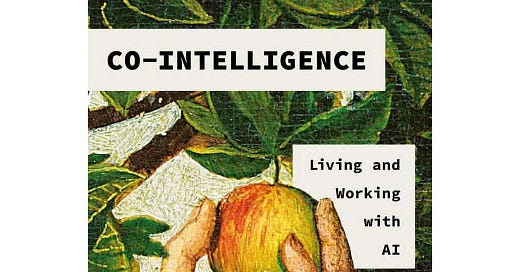The future of work is human + AI
How to leverage AI as your smart assistant and collaborator
Co-Intelligence: Living and Working with AI
By Ethan Mollick
This was the best books I read last year. I keep returning to it, in fact.
Co-Intelligence: Living and Working with AI by Ethan Mollick is one of those rare books that not only explores the future of technology but also reimagines our relationship with it. Accessible, thoughtful, and deeply insightful, the book sheds light on how artificial intelligence (AI) will not replace us but rather work alongside us as a collaborative partner.
Best of all, the book invites us to rethink what it means to “work with AI” and, more importantly, to see AI as a creative ally in our professional and personal lives.
The big takeaway(s)
Co-Intelligence was the last book I read in ‘24; it did not did not disappoint, doing exactly what I’d hoped it would do—challenge my thinking and leave me better equipped to navigate what’s next.
Mollick, a Wharton professor, expertly demystifies AI’s growing role in our lives, offering clear, actionable insights for taking advantage of the technology. If you’ve been wondering how to make sense of AI and use it to work smarter, the book is a worthwhile read. For example, his thoughts on dedicating time to get to know the technology and better understand the Jagged Frontier is useful to everyone.
“As a starting point, follow the first principle (invite AI to everything) until you start to learn the shape of the Jagged Frontier in your work. This will let you know what the AI can do and what it can't. Then start working like a Centaur. Give the tasks that you hate but can easily check (like writing meaningless reports or low-priority emails) to the AI and see whether it improves your life.
“You will likely start to transition naturally into Cyborg usage, as you find the AI indispensable in overcoming small barriers and helping with tricky tasks. At that point, you have found a co-intelligence.”
This framing gives readers a way to think about AI that feels both approachable and grounded in the reality of how we will interact with it in the near future.
A new kind of coworker and creative partner
He makes the case that whether you’re brainstorming ideas, writing, analyzing data, or designing something new, AI can serve as a supportive tool, offering suggestions, refining concepts, and speeding up processes. The key here is that AI doesn’t make decisions for you; it offers ideas, helps refine concepts, and empowers you to push your creative boundaries. In this sense, AI acts as a highly skilled assistant, always ready to help you make your ideas better.
This “co-working” relationship with AI, Mollick explains, allows AI to assist with tasks, not take them over. He uses the example of a writer working with AI: The AI doesn’t write the story for you, but it can help generate ideas, suggest phrasing, or even help brainstorm plot twists. In other words, AI becomes a creative collaborator—a partner in the process—rather than a mere tool or a threat to one’s job.
The author also emphasizes how AI can break down barriers to creativity, expanding the range of creative possibilities, and in so doing become a creative collaborator that helps us take our productivity and our creativity to new levels.
Finally
I recommended Co-intelligence for anyone curious about AI and its future impact on work, creativity, and society.




